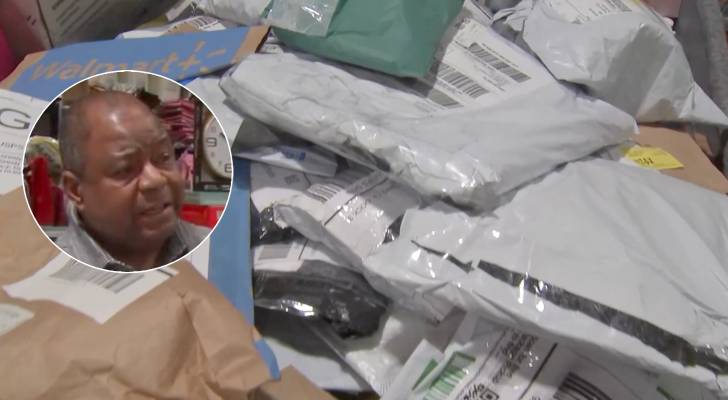
A dollar store in the Bronx has gone viral after a TikTok video showcased its $4 “mystery packages.”
The boxes, which contain returned merchandise from retailers like Amazon, Walmart and others, can hold anything from brand-new sandals to toilet plungers. The thrill of the unknown is part of the appeal — and business is booming.
Don’t miss
- I’m 49 years old and have nothing saved for retirement — what should I do? Don’t panic. Here are 5 of the easiest ways you can catch up (and fast)
- Gain potential quarterly income through this $1B private real estate fund — even if you’re not a millionaire. Here’s how to get started with as little as $10
- Robert Kiyosaki warns of a ‘Greater Depression’ coming to the US — with millions of Americans going poor. But he says these 2 ‘easy-money’ assets will bring in ‘great wealth’. How to get in now
“Just hope and pray, let’s see what happens,” said one shopper outside Dollar Universe.
Store manager Luis Almonte sources the boxes from liquidators in Brooklyn and New Jersey, paying around $600 for pallets of roughly 400 items. The goods are customer returns from across the country, many originally sold by Amazon or Walmart, and resold in bulk through liquidation channels.
But as the store’s popularity grows, so do the questions.
Are these sales legal?
Almonte insisted to WABC 7 Eyewitness News that he’s just trying to run a fun, affordable business. Still, he’s aware there may be legal or ethical lines he doesn’t want to cross.
“I’m going to do an investigation to see, because I don’t want to do anything illegal that hurts myself,” Almonte said.
To test the process, reporter Kemberly Richardson purchased one of the returned items and discovered the original buyer’s full name, phone number and home address were still on the box.
She called the phone number, and the stunned buyer confirmed they had returned what was supposed to be a yoga mat. They were shocked to hear their personal information was still floating around on a resold package.
Almonte said he normally uses a marker to obscure personal information and is willing to go further if needed.
“I scratch the name dark that way nobody sees,” he said, adding that if that’s not enough, he’ll remove items from the packaging altogether.
Walmart told Eyewitness News it requires all its liquidators to remove personal customer information before resale. Amazon said it’s now investigating the matter, including “the possibility that these products may have been delivered to customer addresses, were stolen and are now being resold by unauthorized third parties.”
Read more: Want an extra $1,300,000 when you retire? Dave Ramsey says this 7-step plan ‘works every single time’ to kill debt, get rich in America — and that ‘anyone’ can do it
What happens to those Amazon packages you return?
Returned Amazon packages don’t always go back on the digital shelves. Many are routed to liquidation warehouses where they’re bundled into pallets and auctioned off to resellers. These buyers — like Almonte — often have no idea what’s in each box until it’s opened.
While this resale model isn’t new, the viral popularity of $4 “mystery boxes” is raising fresh concerns about data privacy and consumer protection.
If you return items online, you might assume your personal data is wiped — but that’s not always the case. In rare instances, as this story highlights, packaging labels with full names, phone numbers and addresses can end up in the hands of strangers.
To protect yourself, make sure to:
- Remove or deface shipping labels before returning items, when possible.
- Avoid returns that include sensitive items or personal documents.
- Monitor your accounts and credit reports for unusual activity, especially if you’ve recently made several returns.
This incident doesn’t necessarily mean you need to stop shopping online, but it’s a reminder that once you send a package back, what happens next is often out of your control.
Major retailers like Walmart and Amazon allow third-party liquidation of returns, and they typically have policies in place to protect customer privacy. But as this case shows, gaps can occur — especially when items move through multiple hands.
What to read next
- JPMorgan sees gold soaring to $6,000/ounce — use this 1 simple IRA trick to lock in those potential shiny gains (before it’s too late)
- This is how American car dealers use the ‘4-square method’ to make big profits off you — and how you can ensure you pay a fair price for all your vehicle costs
- Here are 5 ‘must have’ items that Americans (almost) always overpay for — and very quickly regret. How many are hurting you?
Like what you read? Join 200,000+ readers and get the best of Moneywise straight to your inbox every week. Subscribe for free.
This article provides information only and should not be construed as advice. It is provided without warranty of any kind.